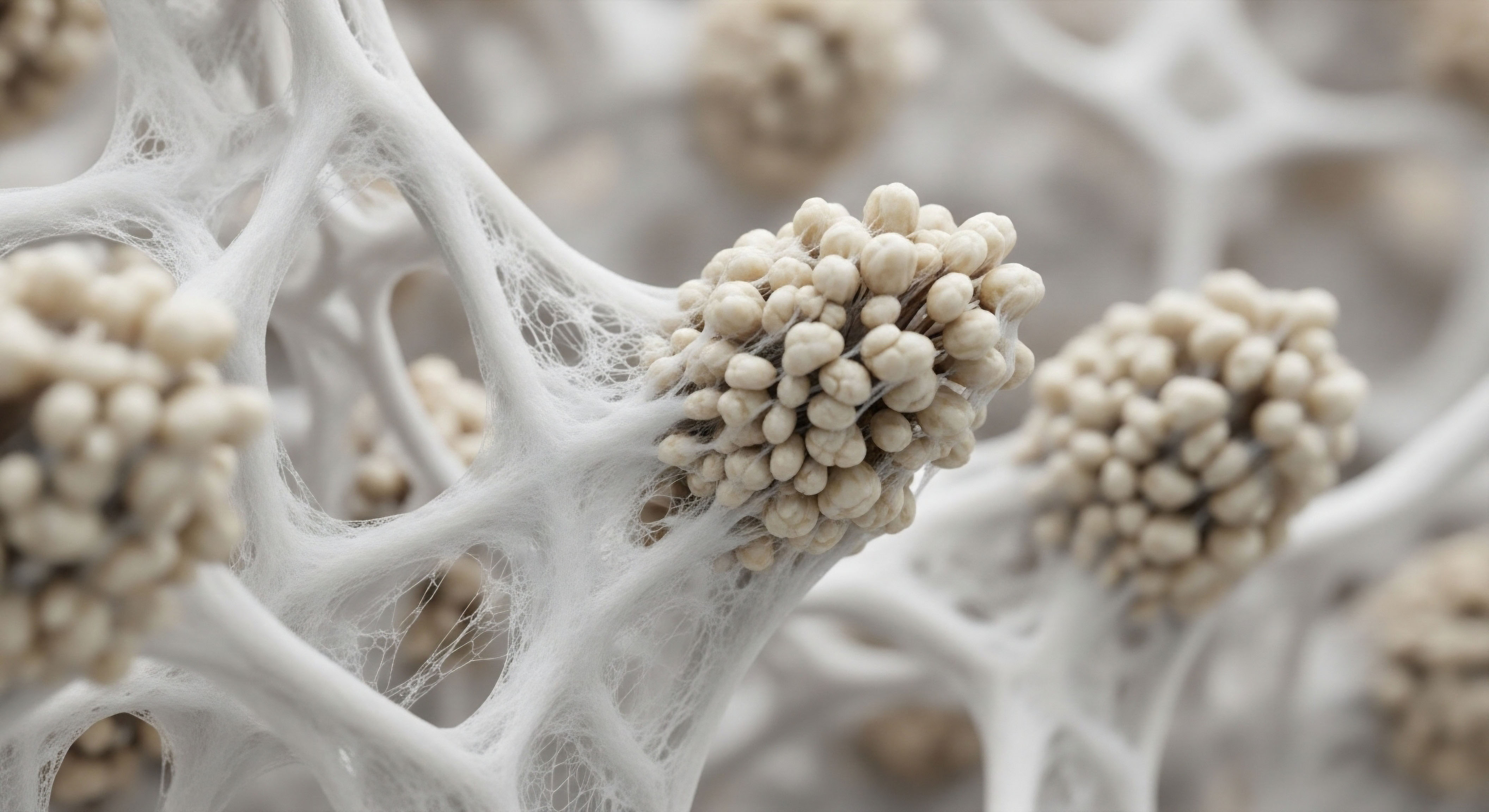

Fundamentals
Consider a moment when your body seems to whisper, or perhaps shout, that something feels profoundly amiss. Perhaps you experience persistent fatigue, unexplained weight fluctuations, or a subtle but undeniable shift in your emotional landscape. These sensations often stem from a fundamental communication breakdown within your biological systems.
Your body’s intricate messaging network, the endocrine system, relies on hormones acting as messengers and cellular receptors as the discerning receivers. When these receivers become less responsive, a state known as receptor desensitization occurs, leading to a cascade of symptoms that can diminish vitality.
Receptor desensitization describes a biological phenomenon where prolonged or excessive exposure to a hormone or neurotransmitter reduces the cell’s responsiveness to that specific signal. Imagine a finely tuned instrument that, after constant, overwhelming sound, begins to lose its ability to distinguish subtle notes. Similarly, your cells, when perpetually bombarded by certain signals, initiate protective mechanisms.
These mechanisms include reducing the number of receptors on the cell surface, altering their binding affinity, or modifying the intracellular signaling pathways. This physiological adaptation aims to prevent overstimulation, yet it can paradoxically lead to a functional deficiency even when hormone levels appear adequate in circulation.
Receptor desensitization represents a cellular adaptation where prolonged exposure to signals diminishes cellular responsiveness.
The human body maintains a delicate equilibrium, where hormones orchestrate metabolic processes, mood regulation, and reproductive function. Insulin, for example, serves as a crucial signal for glucose uptake by cells. When cells, particularly muscle and fat cells, exhibit reduced insulin receptor sensitivity, glucose struggles to enter, leading to elevated blood sugar levels and a compensatory increase in insulin production. This persistent demand on the pancreas can create a vicious cycle, contributing to metabolic dysregulation.
Similarly, glucocorticoid receptors, responsible for mediating the body’s stress response, can become desensitized under chronic psychological or physiological duress. This can impair the body’s ability to appropriately manage stress, leading to sustained inflammatory states and altered mood. Understanding these foundational biological principles illuminates the origins of many common health concerns, providing a framework for reclaiming optimal function.

What Role Do Receptors Play in Cellular Communication?
Cellular receptors function as molecular locks on the cell’s surface or within its interior. Hormones, acting as specific keys, bind to these locks, initiating a precise chain of events inside the cell. This binding event transmits information, dictating how the cell should behave, from regulating gene expression to altering metabolic rates. The efficiency of this communication profoundly influences overall physiological performance.
- Ligand Binding ∞ Hormones, neurotransmitters, and peptides attach to their specific receptors.
- Signal Transduction ∞ This attachment triggers a series of biochemical reactions inside the cell.
- Cellular Response ∞ The cell then executes a specific function, such as synthesizing proteins or storing energy.
When receptor function is compromised, the fidelity of these signals diminishes, and the cell struggles to perform its designated tasks with precision. This diminished responsiveness underscores the importance of maintaining receptor health for systemic well-being.


Intermediate
Addressing receptor desensitization necessitates a thoughtful, multi-pronged approach that extends beyond simple definitions, delving into the precise interplay of lifestyle and cellular biochemistry. The question of whether lifestyle modifications alone can reverse this state often arises from a desire for autonomy in health management. While pharmaceutical interventions offer targeted support, optimizing daily habits provides a powerful, foundational strategy for recalibrating cellular responsiveness.
Consider the profound impact of consistent physical activity on insulin receptor sensitivity. Regular exercise, particularly resistance training, enhances the number of insulin receptors on muscle cell surfaces and improves their efficiency in binding insulin. This facilitates greater glucose uptake, even with less circulating insulin. Moreover, exercise induces signaling pathways that bypass the need for insulin entirely, directly stimulating glucose transporters to move to the cell membrane. This dual action makes physical activity a potent tool in restoring metabolic harmony.
Consistent physical activity significantly improves insulin receptor sensitivity and glucose uptake.
Dietary composition also exerts a substantial influence. A nutritional strategy emphasizing whole, unprocessed foods, ample fiber, lean proteins, and healthy fats helps stabilize blood sugar levels, reducing the chronic insulin surges that can drive insulin receptor desensitization. Omega-3 fatty acids, for example, can mitigate inflammatory processes often associated with reduced receptor sensitivity, thereby supporting optimal cellular signaling. Conversely, diets high in refined carbohydrates and saturated fats contribute to persistent metabolic stress, exacerbating receptor insensitivity.

How Do Specific Lifestyle Changes Influence Receptor Function?
The intricate dance between lifestyle and cellular function unfolds through various biological mechanisms. These interventions do not merely mask symptoms; they directly influence gene expression, protein synthesis, and the trafficking of receptors within the cell.
Stress management techniques, such as mindfulness practices and adequate sleep, play a crucial role in modulating glucocorticoid receptor sensitivity. Chronic stress elevates cortisol levels, which can paradoxically lead to a diminished cellular response to cortisol over time, impairing the body’s ability to resolve inflammation and regulate mood. By mitigating chronic stress, individuals support the proper functioning of these vital receptors, restoring adaptive stress responses.
The following table illustrates key lifestyle interventions and their direct impact on receptor sensitivity ∞
| Lifestyle Intervention | Target Receptor System | Mechanism of Action |
|---|---|---|
| Resistance Training | Insulin Receptors, Androgen Receptors | Increases receptor density and improves signaling efficiency, enhancing glucose uptake and anabolic responses. |
| Balanced Nutrition | Insulin Receptors, Estrogen Receptors | Stabilizes hormone levels, reduces inflammation, and provides substrates for optimal receptor synthesis and function. |
| Stress Reduction | Glucocorticoid Receptors | Prevents chronic cortisol elevation, preserving receptor sensitivity and adaptive stress responses. |
| Adequate Sleep | Insulin Receptors, Growth Hormone Receptors | Regulates circadian rhythms, supports hormone secretion patterns, and promotes cellular repair and regeneration. |
These interventions collectively provide a robust framework for enhancing the body’s intrinsic capacity for self-regulation.


Academic
The question of whether lifestyle modifications alone can fully reverse receptor desensitization demands a deep understanding of cellular and molecular endocrinology. Receptor desensitization, a sophisticated homeostatic mechanism, involves multiple layers of regulation, from post-translational modifications to gene expression. While lifestyle interventions exert significant influence, the extent of reversal depends on the chronicity and severity of the desensitization, alongside genetic predispositions.
Focusing on the intricate dynamics of steroid hormone receptors, particularly androgen and estrogen receptors, reveals a complex interplay with lifestyle factors. Androgen receptors (ARs), crucial for male reproductive health, muscle anabolism, and metabolic regulation, exhibit sensitivity that is highly responsive to external stimuli.
Resistance exercise, for instance, has been shown to upregulate AR expression and enhance their binding affinity in muscle tissue, thereby amplifying the anabolic signals of testosterone. This occurs through complex signaling cascades involving mTOR pathways and direct transcriptional regulation of the AR gene.
Lifestyle modifications modulate receptor function through epigenetic changes and altered protein dynamics.
The mechanistic underpinnings of this adaptation extend to the cellular trafficking of receptors. Prolonged exposure to high concentrations of a ligand can trigger receptor internalization, where the receptor-ligand complex is brought inside the cell, often targeted for degradation or recycling. Lifestyle interventions can influence this process.
For example, intermittent fasting has been observed to enhance androgen receptor sensitivity, possibly by modulating the temporal exposure of cells to circulating androgens and growth factors, allowing for receptor replenishment and improved signaling fidelity.

How Does Epigenetic Regulation Impact Receptor Sensitivity?
Beyond direct receptor modulation, lifestyle factors can induce epigenetic changes that alter gene expression, including the genes encoding receptors themselves. Epigenetics refers to heritable changes in gene function that occur without a change in the DNA sequence. Dietary components, physical activity, and stress can influence DNA methylation and histone modifications, impacting how readily receptor genes are transcribed. A diet rich in methyl donors, for example, can support optimal gene expression for various receptor types, contributing to sustained cellular responsiveness.
The hypothalamic-pituitary-gonadal (HPG) axis, a central regulator of sex hormone production, also experiences indirect modulation through lifestyle. Chronic stress, mediated by the hypothalamic-pituitary-adrenal (HPA) axis, can suppress the HPG axis, altering the production of androgens and estrogens. This, in turn, influences the dynamic regulation of their respective receptors. By alleviating chronic HPA axis activation through stress reduction techniques, individuals create a more favorable endocrine environment for receptor resensitization.
The following list outlines molecular mechanisms involved in receptor desensitization and resensitization ∞
- Receptor Internalization ∞ Prolonged ligand binding can cause receptors to move from the cell surface into the cytoplasm, reducing surface availability.
- Phosphorylation ∞ Specific kinases can phosphorylate receptors, altering their conformation and reducing their ability to bind ligands or activate signaling pathways.
- Transcriptional Downregulation ∞ Sustained signaling can lead to decreased gene expression of the receptor, resulting in fewer receptor proteins being synthesized.
- Ubiquitination and Degradation ∞ Receptors can be tagged with ubiquitin, signaling their breakdown by proteasomes, thus reducing their cellular population.
- Recycling and Replenishment ∞ Lifestyle interventions can promote the recycling of internalized receptors back to the cell surface or stimulate the synthesis of new receptors.
The capacity for lifestyle modifications to reverse desensitization hinges upon these sophisticated molecular feedback loops. Comprehensive, sustained lifestyle adjustments can indeed restore a significant degree of receptor function, promoting a more balanced and responsive endocrine system.

References
- Moeini, Mona, et al. “The Effect of Lifestyle Interventions on Anxiety, Depression and Stress ∞ A Systematic Review and Meta-Analysis of Randomized Clinical Trials.” Healthcare (Basel), vol. 12, no. 22, 2024, p. 2263.
- Bajaj, M. et al. “Improved insulin sensitivity after weight loss and exercise training is mediated by a reduction in plasma fatty acid mobilization, not enhanced oxidative capacity.” Journal of Clinical Investigation, vol. 117, no. 11, 2007, pp. 3426-3434.
- Jiang, Yuan, et al. “Stress-induced glucocorticoid desensitizes adrenoreceptors to gate the neuroendocrine response to somatic stress in male mice.” Cell Reports, vol. 42, no. 12, 2023, p. 113498.
- de Kloet, E. R. et al. “From Receptor Balance to Rational Glucocorticoid Therapy.” Endocrinology, vol. 149, no. 11, 2008, pp. 5535-5541.
- Davey, R. A. and P. T. Handelsman. “Androgen Receptor Structure, Function and Biology ∞ From Bench to Bedside.” Clinical Biochemist Reviews, vol. 32, no. 3, 2011, pp. 97-111.
- Xu, Yan-Fen, et al. “The estrogen receptor and metabolism.” Frontiers in Endocrinology (Lausanne), vol. 15, 2024, p. 1361543.
- Thyfault, J. P. and J. A. Bergouignan. “Update on the effects of physical activity on insulin sensitivity in humans.” World Journal of Diabetes, vol. 8, no. 9, 2017, pp. 324-332.

Reflection
The journey toward understanding your own biological systems represents a profound act of self-empowerment. The knowledge that cellular responsiveness, once diminished, possesses the capacity for recalibration through conscious living is a powerful revelation. This understanding moves beyond a passive acceptance of symptoms, instead inviting a proactive engagement with the body’s inherent wisdom.
Your path to vitality involves a continuous dialogue with your physiology, where informed choices become the architects of restored function. Consider this exploration not as a destination, but as the initial steps on a personalized trajectory toward sustained well-being, where consistent, evidence-based self-care becomes the cornerstone of a life lived with uncompromised function.



